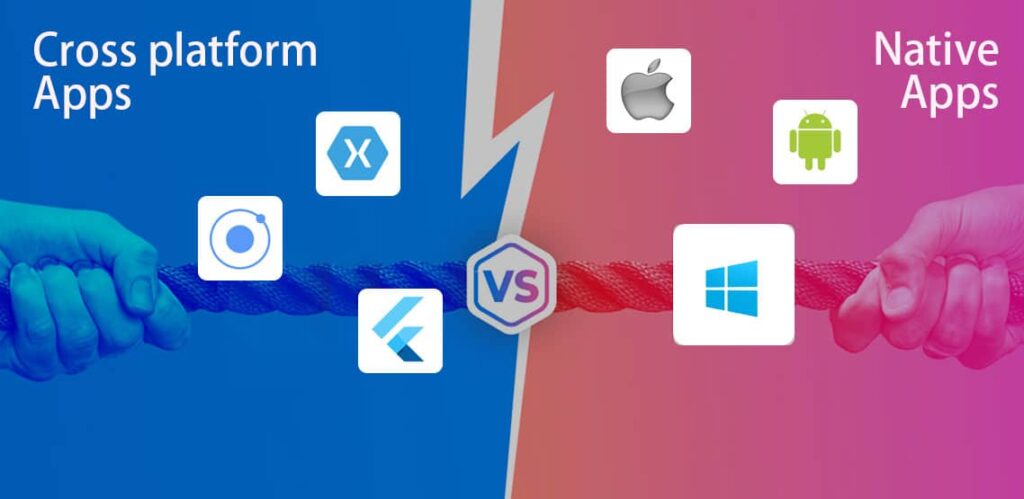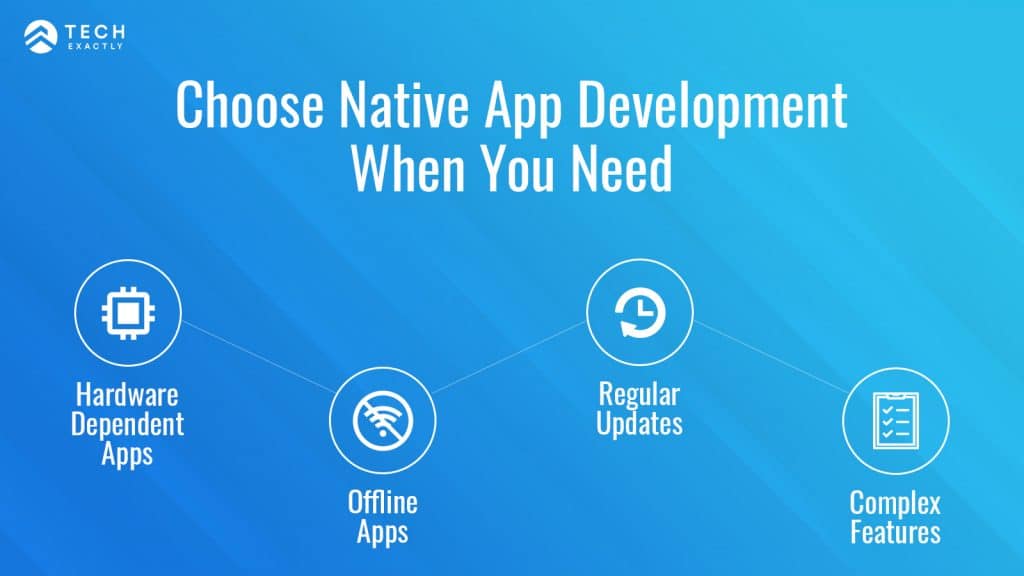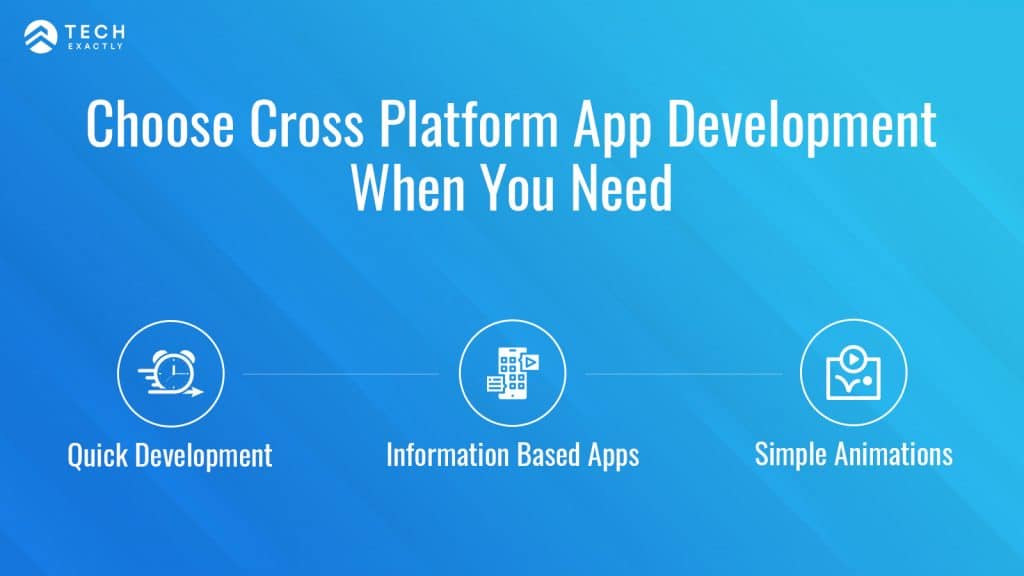Cross Platform Vs Native App: Making a Choice for Your App Development

Do you feel you’re fighting a battle in your head to choose between Native and Cross-platform for your app development? Don’t worry! We’ve all been there.
While both these platforms are equally popular, a recent statista report shows that about 33% of global mobile application developers use cross-platform frameworks while the rest prefer native technologies.
Speaking out of the experience, I believe both approaches have their strengths and weaknesses, hence it’s best for you to get comprehensive knowledge including the difference between native and cross-platform apps before making your final call.
Today, I’m going to share with you tips & tricks that will help you choose the perfect development framework for your apps each time.
Let’s dive right in!!
- What is Native App Development
- Pros & Cons of Native Applications
- What is Cross-platform app development
- Pros & Cons of Cross-platform Applications
- Main Differences Between Native vs. Cross-Platform Apps
- How to Make a Final Choice for Your Business
- Our Experience
- Conclusion
What is Native App Development?
Native App Development is primarily focused on developing apps for a particular platform, say iOS, Android, or Windows.
The biggest advantage of native apps over cross-platform is that by default these apps can leverage the features of an operating system as well as all the device features—camera, GPS, contacts list, gravity sensor, gyroscope, etc. Additionally, it also becomes easier for developers to make full use of all sophisticated functionalities, such as complex networking, memory management, and more.
The biggest drawback? You will need a separate codebase for each platform which is time-consuming and cost-heavy.

Pros & Cons of Native Applications
When it comes to native versus cross-platform and making a choice, it is paramount to learn about the pros and cons of each of these frameworks. Let’s take a look at the pros and cons of native applications first.
Pros of Native App Development
High Performance
Native built apps offer extremely high performance in terms of speed, responsiveness and operational efficiency. This is possible as these platform specific apps are programmed using core programming languages and APIs. Moreover, they are able to leverage the device’s processing speed to its full potential, hence ensuring lower load time.
Broad Functionality
As highlighted earlier, the biggest advantage of native over cross-platform is the former’s ability to access all the features of the platform it is made for. This ultimately results in faster execution & better user experience. Additionally, native apps can function without internet connectivity making it the best solution for complex mobile applications.
Ultimate UI/UX
To create apps with robust and intuitive user experience and consistent look and feel, native technology is your best bet. Developed using native software development kits (SDKs) and destined for a particular operating system, native mobile apps deliver a more natural flow to its users.
Moreover, sticking to specific guidelines allows familiar actions & gestures for users, and maintaining the aspect ratio ensures better visuals and better control over the user interface.
Higher Security and Reliability
Native apps are better poised to protect against security violations than cross-platform apps. How? Native apps are programmed using the core language of the platform, which makes them more secure and reliable.
Also, features such as proactive security upgrades, multi-factor authentication, and remote management controls ensure the strictest data security and privacy.
Store’s Support
It is easier to launch native apps in the app store as they comply with iOS and Android guidelines by default. Native is considered to be preferred both by Google & Apple as they mostly feature native apps in their store. And of course, getting featured on an app store reinforces your brand and gives your downloads a quantum jump.
Cons of Native App Development
High Cost
The biggest drawback of Native development is its cost. There are two primary reasons for this high cost – First, native app development is complex due to which professional development and support consume a lion’s share of the project budget. Note that, native mobile developers are more expensive compared to cross-platform ones. Second, in order to cater to two different sets of audiences i.e., Android and iOS, it requires two distinct native apps, leading to setting up two development teams, and ultimately soaring the total cost.
Difficulties with Updates and Maintenance
Maintaining separate builds for separate platforms that require regular maintenance & support is challenging. You may face difficulty in collaborating with several teams or in rolling out feature updates or new features.
Slow Development Speed
The speed of development is yet another downside of mobile native vs. cross-platform apps. It consumes significantly more time to develop a native app than its cross-platform counterpart does. There’s also no chance to repurpose the native code of one operating system for another, resulting in slower development.
What is Cross-platform app development?
Cross-platform app development provides you the flexibility of building mobile applications using a universal language, making this single app compatible with more than one mobile platform. The key advantage of cross-platform is code reusability, thereby simplifying the entire development process.

Pros & Cons of Cross-Platform Applications
Similar to native applications, cross-platform applications also have their own set of advantages and pitfalls. Let’s explore and learn about them to make a prudent call.
Pros of Cross-platform App Development
Cost-Effective
Built on the concept of ‘write once, run everywhere’, cross-platform app development enables you to use a single codebase on multiple platforms, resulting in a significant cut in the cost of development.
This approach also allows deploying one development team to build a single app and distribute it on multiple app stores. When it comes to selecting cross-platform against native apps, this cost-effective nature plays a crucial role.
Quick Development
Cross Platform enables developers to reuse almost 50-80% of the original codebase. A significant amount of development time is saved by re-using codes instead of writing them from scratch. As a result, you are able to launch fully functional feature-rich business apps much faster.
Easy App Support and Maintenance
Today, when it’s natural to release frequent updates in mobile apps, maintenance costs & time may suck up a lot of your resources. That is where Cross-Platform earns some brownie points.
Regular maintenance & support becomes simple & hassle-free with cross-platform vs. native app. Due to a single codebase, the team is able to quickly roll out updates and introduce new features or patches for multiple platforms simultaneously, resulting in a much improved mobile service.
Faster time to market
Quick development means reduced time to market. From launching a new app to rolling out a new feature for both iOS and Android audiences, cross-platform does it all for you very quickly.
Maximum Exposure to the Target Audience
Cross-platform app development is focused on multiple platforms, which enables you to cater to a larger customer base at one go. With cross-platform, a single app has an unprecedented reach as it can be distributed on iOS, Android as well as other operating systems like Windows, macOS, and Linux depending on business requirements. This empowers organizations to reach out to a wide-ranging audience with a small budget.
Cons of Cross-platform App Development
Limited Functionality
When it comes to functionality, cross-platform applications fall short. They have limited accessibility to the operating system features, no access to the native APIs, and do not work without an internet connection. This impacts the overall user experience of the app.
Limited support of 3rd-Party Libraries
Another challenge with the cross-platform app development framework is that it is not compatible with all 3rd-party libraries and software development kits (SDKs). This propels developers to spend much of their productive hours figuring out alternatives so that the desired functionality can be integrated into the app.
Integration Issues
Since cross-platform apps are built on a one-app-fits-all approach, integration is usually an issue. While integrating the application with the local settings, it’s common to see that they do not integrate flawlessly with the target operating system, and result in app failure.
Main Differences Between Native vs. Cross-Platform Apps
Now that we are fully aware of what each of these frameworks are, let’s take a quick glance at the difference between cross-platform and native apps:
| Parameters | Native | Cross-Platform |
| App Performance & Speed | High performing apps that are fast, responsive, and less likely to crash. | Cross-platform apps are often plagued with performance issues. But do you find the performance of cross-platform apps like Facebook, and Myntra poor? Hardly! In reality, cross-platform apps are comparatively slower than the native ones. |
| App Development & Maintenance Cost | High cost of development since it requires building more than one app if you wish to distribute your products or services to multiple platforms. Maintenance is equally time-consuming and costly. |
Relatively cheaper in terms of both development and maintenance. |
| Development Time: | High, as codes have to be written from scratch for each platform. | Low, as single code can be used on multiple platforms. |
| Time to Market | High, as two apps have to be developed which may take time. | Code reusability reduces the time to launch the app. |
| User Experience | Offers amazing user experience resulting from high speed, better performance, better visuals, and optimum utilization of the device’s features. | Relatively low as it gets difficult for developers and designers to cater to all the UX requirements of multiple platforms in a single app. Moreover, an attempt to enhance UX often hampers speed. |
| Features | Platform SDK ensures access to the device’s API without any hindrance Another great advantage of native apps is that they allow offline features, unlike cross-platform apps. |
No assured access to the device’s API. |
| Language Compatibility | Native apps are developed in platform specific language. For instance, Objective C and Swift for iOS, while Java or Kotlin for Android. | Cross-platform apps are developed in Javascript which is compatible with multiple platforms. |
| Programming Expertise | Native developer’s skills usually cost more and are difficult to obtain. | Required expertise is easier to find as most cross platform frameworks are web based. |
| Customer Reach | By developing an app for one platform, you may lose up to 50% of potential app users. Targeting a larger audience requires a larger investment. | Broader user base as cross-platform allows to promote one app through different platforms. |
| App Store & Google Play Authorisation | Easy | Authorization of these applications in the App Store or in Google Play is time consuming. Moreover, every update is also separately authorized before it’s made available for use. |
| Dependency | Less dependent on other open source libraries or platforms | Largely dependent on various libraries and tools. |
| 3rd Party SDK’s availability | Excellent | Average |
| UI Consistency | Consistent with the UI components of the device | Limited consistency. |
| Team Size | Big (Separate teams for each platform) | Medium to Small (One team for all platforms) |
| Tools | Java, Kotlin | React Native, Flutter, Xamarin |
| Examples | Bloomberg |
How to Make a Final Choice for Your Business?
From the discussion so far, it’s quite evident that both cross-platform and native app development technologies have their own set of advantages and drawbacks. And because you’re now adept at these frameworks, making a final choice might not be that difficult. In my opinion, you should make the call based on the needs of your project, the timeline, and the budget.
But wait, there’s more…
To make your selection process easy and smooth, I’ve developed a list of scenarios where choosing native or cross-platform would be ideal. Hope this helps!
Choose Native App Development If You Want an App :
- that is highly responsive and fully functional
- that has no budget constraints
- that works without internet connectivity
- that caters to a specific set of audiences i.e., you’re sure which device your target customers use, Android only or iOS only.
- that is expected to require regular updates and improvements by introducing new features and functionalities
- that are expected to include Complex And Rich-In-Class Features like AR/VR, games, etc. And still deliver a smooth user experience.
- that leverages all phone resources and operating system features.

Choose Cross-platform App Development If You Want An App:
- that caters to multiple markets without having to make separate apps.
- that is developed quickly and in the most cost-effective way.
- that won’t require complex animation or performing excessive calculations
- that requires uninterrupted internet connectivity to download content
- that is developed purely for information or content distribution

Our Experience
So, in this battle of cross-platform vs. native development, who do you think wins?
Well, I believe, this is completely situational as each one has its distinct play areas.
If you want a reliable app with fantastic performance, no budget and time constraint, and targeted to only Android or iOS user base, choosing native over cross-platform development would be like hitting the bull’s eye.
On the other hand, if you want to develop apps which focus on a broader user base and are developed in the most cost & time effective way, cross-platform apps would be the best bet.
Conclusion
Does the thought of choosing the right technology for your app bother you? Let go of your worries and place your trust in the team of experienced web developers at Techexactly. We realize that every business has its unique set of requirements to address its challenges. This is why we offer services to our clients in various technologies, including native and cross-platform, to build the perfect mobile application, tailor-made for their enterprise.
